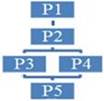You probably know many of the things that you can do with the hundreds of different muscles(肌肉) in your body. But have you ever thought about how the muscles in an animal's body are different from yours? An animal's muscles are made to do the things that are most important for its life.
Lions are hunters. They depend on their ability to catch other animals. Lions must be fast in order to catch their prey(猎物). The powerful muscles in their back legs allow them to run at speeds of more than 30 miles per hour. They can also jump a distance of more than 35 feet. The strong muscles in their front legs help them catch their prey.
Snakes also use their muscles for hunting prey and for movement, but their muscles work in very different ways than lions' do. Because snakes do not have any legs, they use their muscles to push against the ground or other objects to move themselves forward. Their muscles also allow them to eat things that seem much too large. For example, a snake may eat an egg that is larger than the width of its body. How does this happen? The snake's strong neck muscles work together to push the egg down the mouth.
The elephant's long nose has a lot of muscles. Scientists believe that the nose alone has more than 100,000 muscles! This is because the elephant uses its nose much in the same way that people use their hands and fingers. Even though the nose is large, it can perform surprisingly tasks. For example, an elephant can pick up a small leaf from the ground. The nose can also be a powerful tool. An elephant can use its nose to pick up a tree by its roots or even to lift a baby elephant.
The great muscles of these animals seem pretty unbelievable. But the muscles in your body work exactly the way you need them to. After all, it might be fun to be able to jump a distance of 30 feet, but as a human being, there is just not much need for it.
 B .
B .  C .
C .  D .
D . 